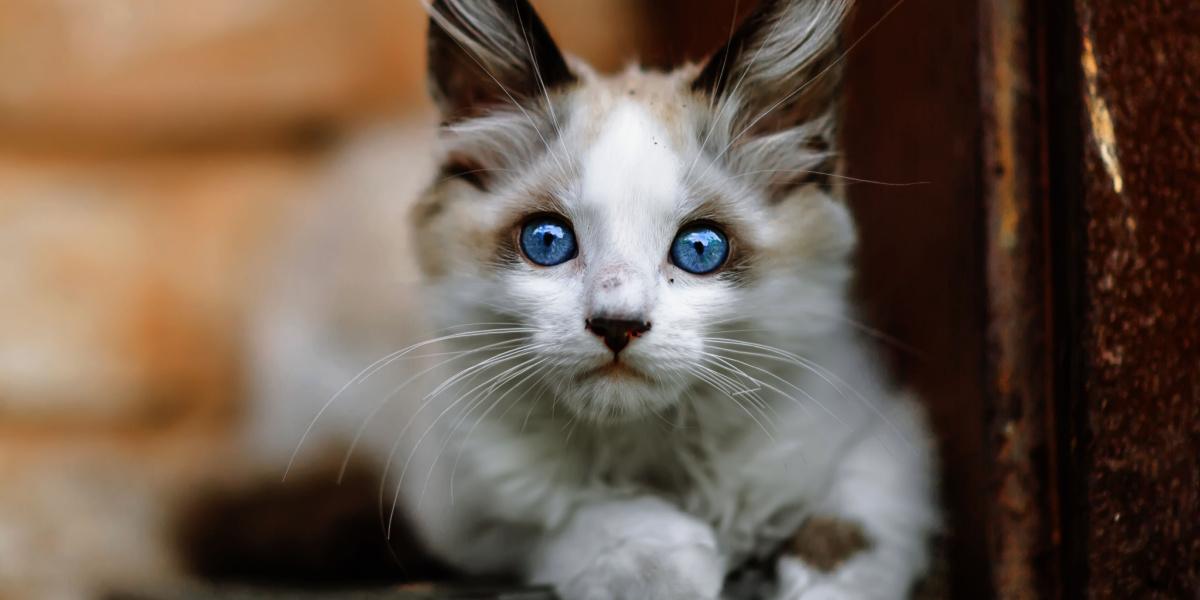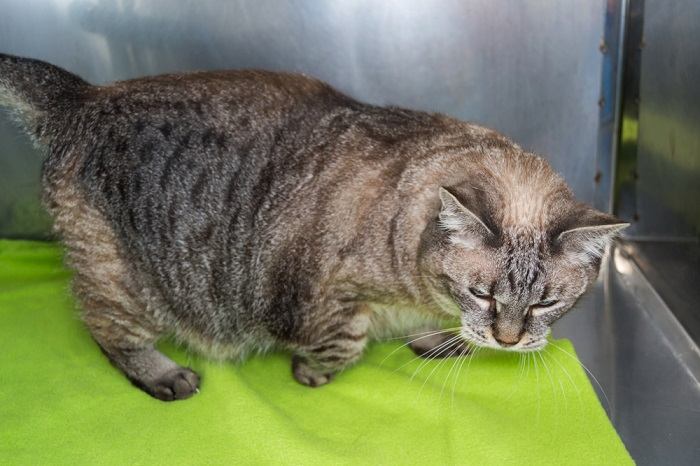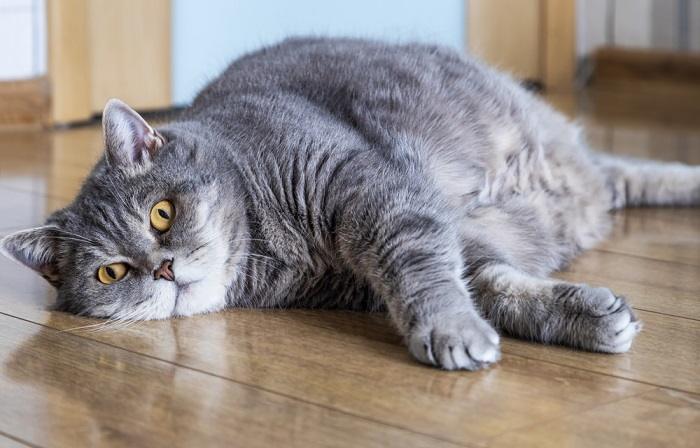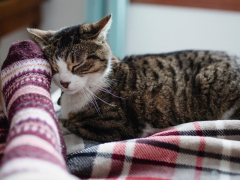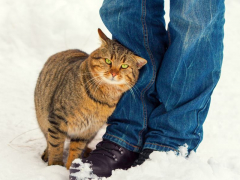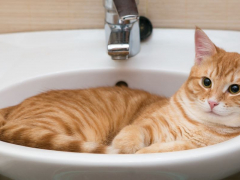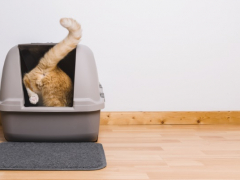Cats are usually fastidious creatures, grooming themselves multiple times a day. Your cat’s tongue is well designed for this function, with tiny barbs which act like a miniature comb, perfect for cleaning dust and grime from hair.
If your cat’s coat is starting to look a bit less sleek, or you’ve noticed clumped hair and mats, and you’re also noticing that your cat is not eating well, it could be a sign of concern. This can be due to multiple factors, including obesity, age, pain, or illness. It might even be that they never learned the skills well as a kitten!
A lack of grooming and lose of appetite can indicate that something is wrong, and your cat may need to be seen by a veterinarian.
Cats may stop grooming or eating due to various health issues like dental problems, arthritis, skin conditions, or internal illnesses Changes in the environment, introduction of new pets, or household disruptions can stress cats, leading to decreased grooming and weight loss. A vet's advice is crucial for a proper diagnosis and tailored treatmentKey Takeaways
Why Is My Cat Not Eating or Grooming?
Both Grooming and eating are an essential part of a cat’s life. A change to this instinctual habit can be a signal that something is wrong. Some kittens never learn to groom properly if they have had a poor start due to illness or separation from their mother.
Cats may stop grooming because they are feeling stressed or anxious, leading to them hiding away more and not pursuing their usual routines, or because of illness or pain physically preventing them. Obesity is also a leading factor in why a cat’s grooming routine goes south: fat cats just aren’t flexible enough to reach those tricky areas!
Key Reasons Why Cats Stop Grooming or Eating
Here are the most common causes behind a cat not grooming themself.
Stress
Cats can suffer from anxiety, but the signs can be very subtle. Causes of stress may include a new pet, a new family member, or a change to their environment such as building work in the house.
Anxiety can present in many ways, with some cats only showing small changes to their behavior. Hiding away, urinating outside the litter box and changes to their interactions with you can all be signs of stress, as can a deterioration in their grooming and eating habits. If you notice that your cat doesn’t seem themself, as well as changes to your cat’s coat, seek veterinary advice.
Age
Older cats are more likely to look a little less well-groomed and eat less throughout the day, often with patches of matting fur or long claws. Elderly cats may be getting stiff with signs of arthritis, so they struggle to contort themselves into the correct positions for grooming.
Your cat’s nails may be getting longer as they cannot sharpen them as well. It is also possible to see a cognitive decline (dementia) in a more senior cat, leading to changes in their routine such as forgetting where their food bowl is, urinating outside the litter tray, vocalizing more, and having poor hygiene.
Illness and Pain
Any type of illness or pain can make cats feel miserable, depressed, and low. This leads to a change in their habits and routines – eating less, interacting less, and grooming less. They may hide away, be more grumpy or even aggressive, and generally not be their usual selves. There are a few common health conditions that can be linked to a decrease in grooming and appetite although any illness can cause problems.
Dental Disease
Pain and discomfort in the teeth and gums can cause a change in eating habits, excess salivation, and irritation, but it can also your cat to stop grooming or chewing properly. Dental disease is very common in cats, especially older felines.
Arthritis
Older cats, cats with conditions like arthritis, and obese cats especially may struggle with self-grooming at some point.
Painful joints deter cats from reaching body positions in which they can comfortably groom. This health complaint is more common in cats over the age of 10 years but can occur in any cat. Other joint and mobility issues can cause the same problems.
Hyperthyroidism
An overactive thyroid gland causes symptoms such as a ravenous appetite, weight loss, and increased urination and thirst, but it can also cause changes to your cat’s fur, making their coat look dull and unkempt. Diabetes and kidney disease can cause similar changes.
Skin Disease
Cat’s skin can be sensitive, and any problems such as allergies, parasites (including fleas and mites), and infections can all cause skin irritation. This can lead to hair loss and scratching. Some conditions cause excessive grooming (due to itchiness), but some conditions make the skin so sore the cat may stop grooming altogether.
Obesity
Sometimes larger cats need help getting themselves clean.
Overweight cats are becoming more common, with current estimates showing that over 50% of pet cats in the US are overweight or obese. As well as predisposing cats to certain diseases such as joint problems and diabetes, obesity can affect their everyday routines such as grooming habits and overall appetite.
Overweight cats often just can’t physically reach parts of their body to clean by licking with their tongues, and this leads to areas of your cat’s fur becoming matted and unkempt.
When Should You See a Vet?
A lack of grooming can indicate there is an underlying problem with your cat. If your cat has stopped grooming themselves properly as well as a lose of appetite, a check-up with a vet is always a good idea.
Think about whether there are any other changes to your cat’s habits or routines, such as a change to their appetite, sleeping or hiding away more, or signs of pain such as difficulty jumping up or down. Gently check your cat’s skin for any signs of redness, irritation, lumps, or bumps. You may see signs of parasites, such as flea dirt.
If your cat is approaching their senior years, frequent wellness exams are recommended to check for signs of age-related problems such as cognitive decline and arthritis. If your cat is struggling with their weight, speak to a veterinary professional about a suitable diet plan for them.
Also Read: The Ultimate Persian Cat Grooming Guide
Frequently Asked Questions
Why is my cat not grooming?
Your cat may not be grooming due to stress, pain, illness, obesity or old age. Some kittens never learn to groom properly. If your cat’s coat is looking unkempt, get them checked out by a vet and start a gentle brushing routine.
How do you clean a cat that doesn’t groom?
Cats generally don’t need bathing unless very soiled. A good brushing will remove dirt and debris, and loose hair, matts and tangles. The brushing will also spread the cat’s natural skin oils over their coat.
Why do old cats stop grooming?
Poor grooming in older cats is often the result of painful conditions such as arthritis or dental disease, or cognitive decline. Other illnesses can result in your cat being too lethargic to groom, or if your cat is overweight, they may not be able to reach some tricky bits.
How do you encourage your cat to clean itself?
If your cat is not grooming well, a check up with a vet is advised to rule out painful conditions such as arthritis, or other disease. Begin a daily grooming routine with your cat, brushing them regularly to improve coat condition and prevent matts and knots.
